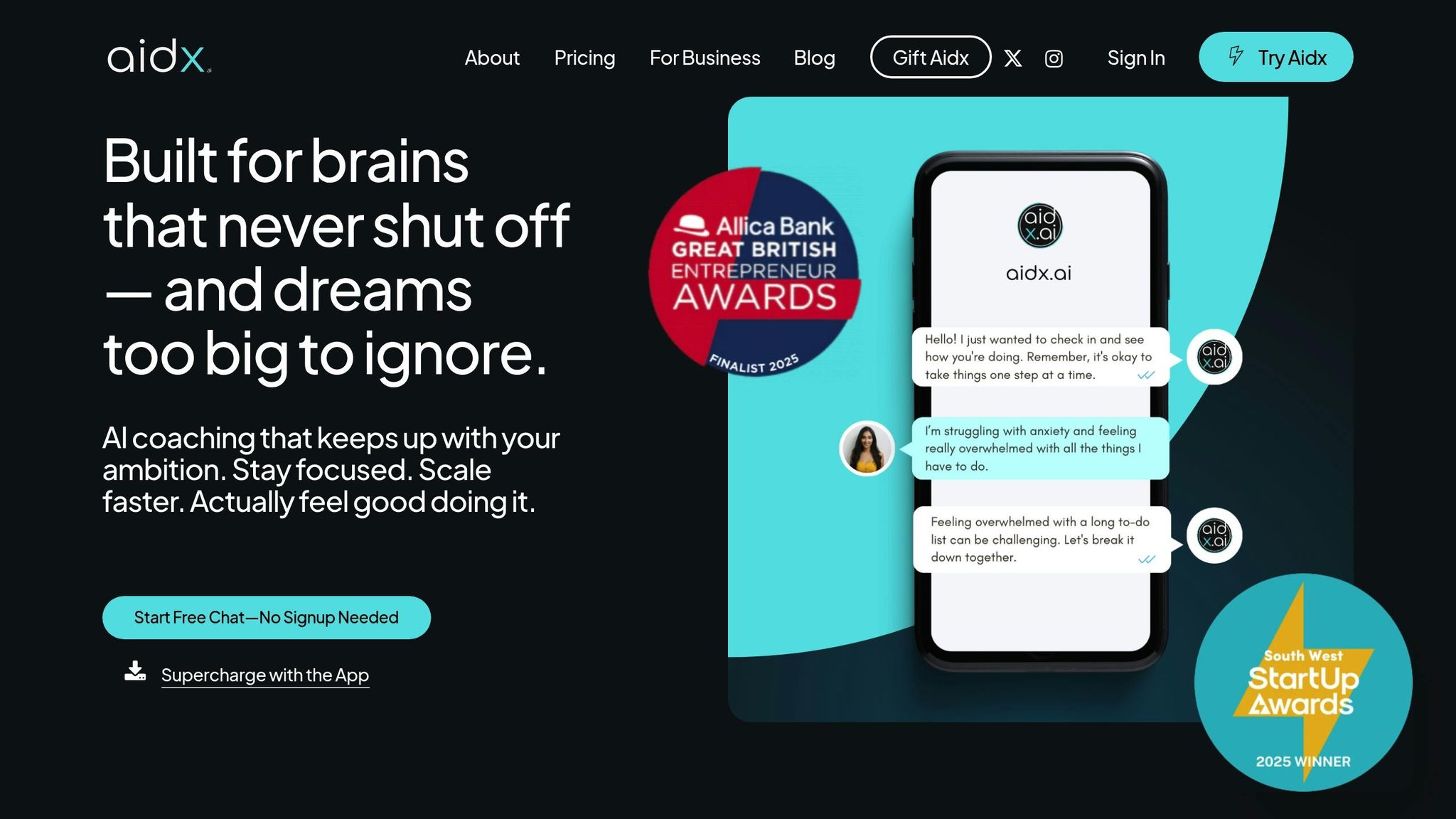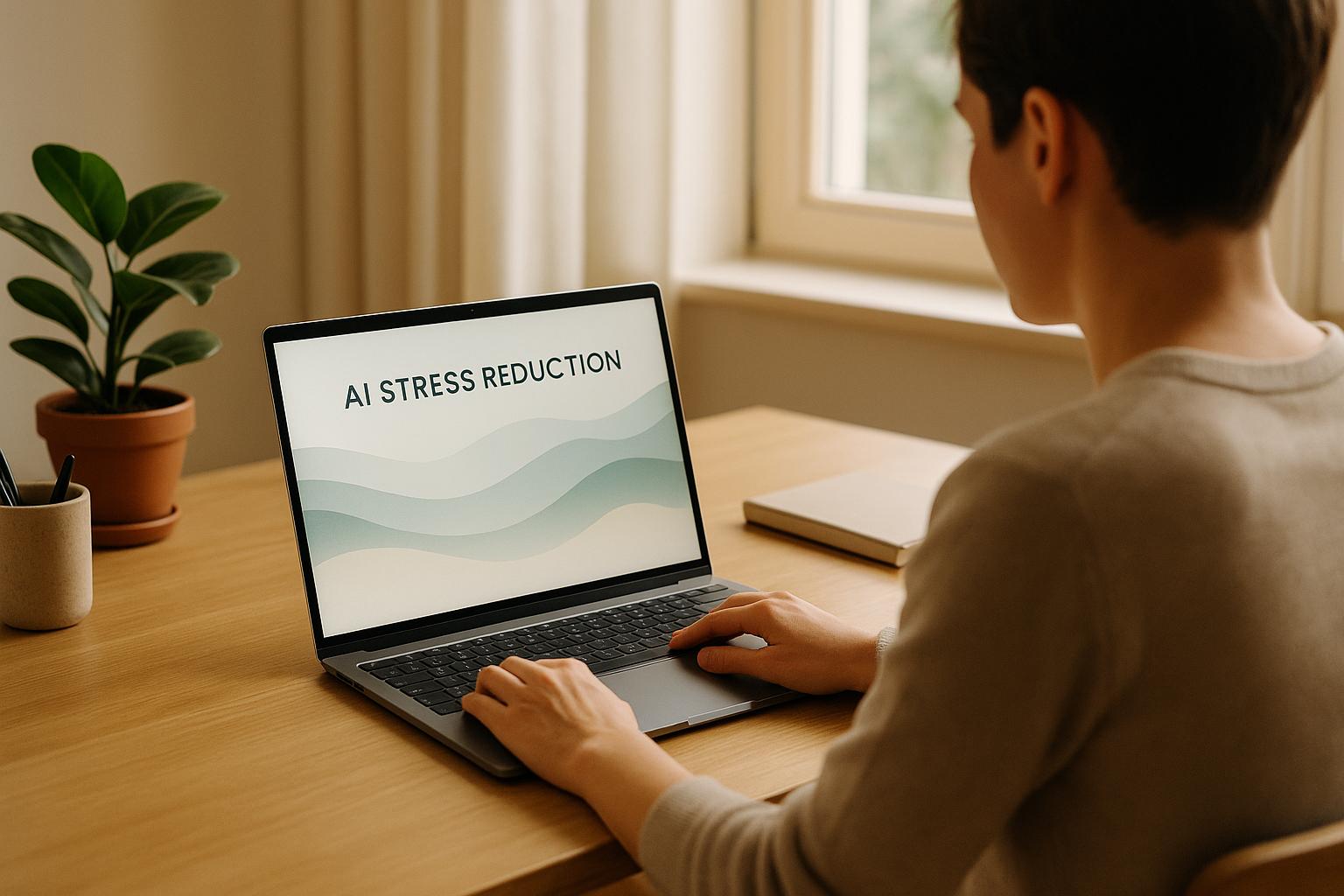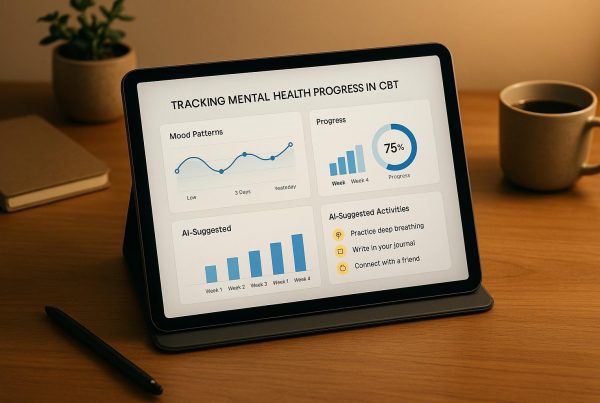AI is transforming how we manage stress by offering personalized, real-time solutions that fit seamlessly into daily life. These tools analyze your behavior and emotions to provide tailored support, such as guided breathing exercises, mindfulness activities, or cognitive behavioral therapy (CBT) techniques. Unlike traditional methods, AI tools are accessible 24/7, cost-effective, and private, making stress management more convenient and effective.
Key Insights:
- Why Stress Matters: Chronic stress harms mental and physical health, leading to anxiety, high blood pressure, and more.
- How AI Helps: AI tracks stress through voice, typing habits, or wearables, offering immediate interventions like relaxation exercises or CBT-based guidance.
- Benefits:
- Always available, no appointments needed.
- Affordable compared to therapy ($100–$200/session).
- Private and stigma-free.
- Customizable to individual stress patterns.
- Techniques:
- Automating repetitive tasks to free mental energy.
- Emotion tracking for real-time support.
- Personalized stress management plans based on habits and triggers.
- Example Tool: Aidx.ai uses advanced AI to deliver therapy-like support, with features like voice-enabled coaching, mood tracking, and progress analytics.
AI tools like these are easy to integrate into your daily routine, whether for quick stress relief or long-term mental health improvement. Start small, set clear goals, and let AI complement your existing self-care practices for better stress management.
The Future of Stress Management: AI-Powered Tools and Techniques
Main AI Techniques for Stress Reduction
AI is reshaping how we manage stress by targeting various sources of daily tension. By blending multiple approaches, it creates a support system tailored to your unique lifestyle and needs. Let’s explore some of the key techniques making this possible.
Automating Daily Tasks
One of AI’s most practical contributions to stress reduction is automating repetitive tasks. Think about all the mundane activities that fill your day – data entry, scheduling, administrative work. By delegating these to AI, you free up mental energy for more meaningful and creative pursuits.
Research backs this up: 64% of workers report that automation reduces their workload and stress, and 71% prefer using technology for manual tasks[2]. A 2021 survey revealed that over two-thirds of office workers globally feel trapped in repetitive tasks[3]. For example, one nonprofit organization adopted software to replace manual processes, saving more than 100,000 hours in a year and significantly reducing staff turnover[3].
Even small steps in automation can make a difference. Start by identifying your most time-consuming tasks, then try out an AI tool with a free trial. Begin with one process, track its impact, and expand gradually as you gain confidence in the system[4].
Custom Stress Management Plans
AI goes beyond generic advice by crafting personalized stress management strategies. These systems analyze data from your daily habits, sleep patterns, work schedule, and interactions to pinpoint your stress triggers and recommend tailored solutions.
For instance, if your stress spikes on Monday mornings, the system might suggest mindfulness exercises to ease the transition into the week. Some AI platforms even integrate data from wearables and user input to customize daily routines, movement exercises, and recovery plans. Users of such platforms have reported a 54% reduction in stress after just one week[5]. These plans adapt in real time, offering more support during tough times and helping you sustain long-term resilience. Additionally, AI can monitor your emotions continuously, ensuring you get immediate assistance when you need it most.
Emotion Tracking and Real-Time Help
AI’s ability to track emotions in real time is another game-changer. Using tools like sentiment analysis, voice and facial expression analysis, and data from wearables, these systems detect stress levels before they escalate[6][7]. By combining predictive analytics with insights from your behavior – like disrupted sleep or social withdrawal – AI can deliver timely interventions[8].
Dr. Brennan Spiegel from Cedars-Sinai emphasizes the potential of this technology, saying:
"This data suggests that with thoughtful design, AI can offer equitable and personalized care."[9]
Researchers are also pushing the boundaries of emotion tracking. Huanyu "Larry" Cheng from Penn State explains:
"This is a new and improved way to understand our emotions by looking at multiple body signals at once… Relying only on facial expressions to understand emotions can be misleading. People often don’t visibly show how they truly feel, so that’s why we’re combining facial expression analysis with other important physiological signals, which will ultimately lead to better mental health monitoring and support."[10]
When choosing AI tools with emotion tracking, prioritize those that incorporate established therapeutic approaches, like cognitive behavioral therapy (CBT), and are transparent about their methods. Reviewing privacy policies is crucial to ensure your sensitive emotional data is handled responsibly[5]. Encouragingly, 32% of people worldwide are open to using AI for mental health support, and early studies suggest that AI-powered chatbots can alleviate anxiety and depression within weeks[5].
How AI Stress Reduction Tools Work
Grasping how AI stress reduction tools function can help you decide which ones to trust with your mental well-being. These tools blend advanced data processing with proven therapeutic techniques to create tailored support that aligns with your personal needs.
Data Analysis and Personalization
AI stress reduction tools gather and analyze various data streams to map out your stress patterns. They pull information from your interactions with the platform, mood check-ins, and other inputs. By examining factors like sleep quality, work pressures, and social activities, these tools can pinpoint patterns and suggest proactive coping strategies. Machine learning plays a crucial role here, continuously refining its understanding to predict when you might need assistance.
To keep your sensitive information safe, high-quality systems encrypt your data during both transmission and storage. This ensures that while the AI personalizes its support, your privacy remains intact. These data-driven insights are the backbone of how these tools deliver effective therapeutic techniques.
Science-Based Methods
The best AI stress reduction tools go beyond generic relaxation exercises. They incorporate evidence-based therapeutic approaches that have been validated in clinical settings. These include methods like Cognitive Behavioral Therapy (CBT), Acceptance and Commitment Therapy (ACT), Dialectical Behavior Therapy (DBT), and Neuro-Linguistic Programming (NLP).
Research supports the effectiveness of these tools. For instance, a meta-analysis found that AI-powered conversational agents significantly reduce symptoms of depression and distress, especially when they use a mix of therapeutic methods [11]. One study from 2017 reported notable improvements in PHQ-9 scores after just two weeks of daily chatbot use [12].
These tools simplify complex therapeutic techniques into manageable, conversational exercises. For example, if you express negative thoughts, a CBT-based AI might guide you through exercises to challenge those thoughts, helping you uncover cognitive distortions and adopt a more balanced outlook. Advanced systems also adapt these methods over time, ensuring their support evolves with your needs.
Learning AI Systems
A prime example of advanced AI technology is Aidx.ai’s Adaptive Therapeutic Intelligence (ATI) System™, which demonstrates how learning systems can elevate stress management. Unlike static programs that offer the same responses repeatedly, learning AI systems analyze your behavior and adjust their strategies to better suit your progress.
The ATI System™ identifies recurring challenges and offers targeted techniques to help you work through them. It also learns your communication style and emotional patterns, creating a more personalized experience. By combining your direct feedback with behavioral indicators like engagement and goal progress, these systems deliver tailored support while keeping your data secure.
This adaptive approach ensures that the support you receive feels relevant and responsive, making these tools a valuable ally in managing stress effectively.
Adding AI Stress Reduction to Your Daily Routine
Incorporating AI tools for stress reduction can be simple and seamless. By taking small, practical steps, you can weave these tools into your daily life and enjoy consistent support throughout your day.
Setting Up and Personalizing AI Tools
The first step in using AI stress reduction tools is selecting a platform that suits your needs and personalizing it to fit your lifestyle. This setup process is key to helping the tool understand your stress triggers and preferences.
Begin by identifying what causes your stress and what you hope to achieve. Are you trying to ease workplace tension, sleep better, or manage general stress? Knowing your goals ensures the AI provides tailored support from the start. Many platforms include an initial assessment to evaluate your stress levels, coping habits, and daily routines.
Be clear about how much time you can dedicate – whether it’s 5 or 10 minutes – so the system can adjust its recommendations accordingly. These tools are designed to work effectively even within short timeframes.
Pay close attention to privacy settings during setup. Review how your data will be collected and shared, and adjust settings to match your comfort level. Reputable tools encrypt your data and let you control what’s stored and analyzed.
As you use the tool, it learns from your interactions. Over time, it tracks which techniques work best for you and when you’re most likely to engage. This ongoing learning helps the tool offer increasingly relevant and effective support.
Using Multi-Platform and Voice Features
Modern AI tools are designed to fit seamlessly into your day, no matter where you are. With multi-platform access, you could start a breathing exercise on your phone during your commute, switch to a quick meditation on your work computer, and wrap up with an evening reflection using a voice assistant at home.
Voice-enabled features make these tools even easier to use. Instead of navigating menus or typing, you can simply speak naturally about how you’re feeling. This hands-free option is especially helpful during busy moments or when stress levels are high, offering immediate and intuitive support.
Cross-platform synchronization ensures your progress and activities are updated across all your devices, creating a smooth and uninterrupted experience throughout your day.
With your tools integrated into your routine, the next step is setting clear goals and tracking your progress.
Setting Goals and Tracking Progress
Once your AI tool is personalized, it’s important to define clear, measurable goals to track your stress management journey. Instead of a vague aim like “reduce stress,” set specific objectives, such as completing three 5-minute breathing exercises each week or practicing relaxation techniques to improve sleep quality.
AI tools use adaptive learning to adjust based on your engagement. As you interact with the system, it monitors your stress levels, how often you use the tools, and which strategies are most effective. This data creates a detailed view of your progress and highlights what works best for you.
Regular mood surveys and stress ratings allow the AI to refine its recommendations and suggest interventions at the right times. For instance, if you often feel stressed on Tuesday afternoons, the system might suggest a quick relaxation session during that window.
Smart notifications ensure you stay connected to your goals without feeling overwhelmed. These reminders are thoughtfully timed based on your schedule and past habits, whether it’s a nudge to meditate after a meeting or a prompt for a breathing exercise during a tense moment.
Many tools also feature analytics dashboards that visually track your progress. These insights show improvements in areas like stress levels, sleep quality, and overall well-being. Seeing tangible results can boost your motivation and reinforce the benefits of staying engaged with your AI stress reduction tools.
sbb-itb-d5e73b4
Case Study: Aidx.ai for Stress Reduction

Aidx.ai showcases how advanced AI can reshape stress management, offering more than just basic chatbot interactions. This platform delivers personalized therapeutic support tailored to each user’s specific stress patterns and needs, going beyond generic relaxation techniques.
What makes Aidx.ai stand out is its ability to adapt to real-life stressors. Instead of one-size-fits-all solutions, it provides coaching that evolves alongside your circumstances. By combining AI technology with proven therapeutic practices, Aidx.ai creates a stress management system that fits seamlessly into even the busiest schedules.
Personal Coaching with Adaptive Therapeutic Intelligence
At the core of Aidx.ai is its Adaptive Therapeutic Intelligence (ATI) System™, designed to function like a personal therapist. This system learns from every interaction, tailoring techniques such as CBT (Cognitive Behavioral Therapy), ACT (Acceptance and Commitment Therapy), DBT (Dialectical Behavior Therapy), and NLP (Neuro-Linguistic Programming) to your specific needs.
The ATI System™ identifies patterns in your stress triggers, emotional responses, and coping methods. For instance, if you frequently report workplace stress, the system recognizes this and proactively offers strategies before the stress escalates. It might recommend breathing exercises that have worked for you in the past or guide you through a quick mindset shift tailored to workplace anxiety.
This adaptive approach ensures that stress management becomes increasingly effective over time. Unlike static apps that recycle the same advice, Aidx.ai adjusts its recommendations based on your progress and evolving circumstances. It also offers specialized modes to address different needs:
- Microcoaching mode: Quick 5-minute sessions for immediate relief during a busy day.
- Embodiment mode: Exercises that help you visualize and physically experience calmness.
- Incognito mode: Private sessions that delete automatically after 30 minutes, perfect for sensitive moments.
Voice Support and Multi-Platform Access
Aidx.ai’s voice-enabled interface makes it easy to get support without lifting a finger. Instead of typing or navigating through menus, you can simply speak about what’s troubling you. The AI responds conversationally, offering real-time guidance whether you’re commuting, taking a break, or relaxing at home.
This hands-free feature is especially helpful during high-stress moments when typing feels like an extra burden. Voice interaction ensures that support is immediate and accessible, making it feel more natural and intuitive.
The platform’s multi-platform integration ensures seamless access across devices. You can start a session on your desktop, continue on your phone during your commute, and receive follow-up reminders via messaging apps like Telegram. Notifications are thoughtfully timed based on your usage patterns and stress levels, ensuring they provide support without becoming intrusive.
Planning and Self-Monitoring Features
Aidx.ai also includes tools to help you plan and track your progress. Its planning system lets you set clear goals, schedule reminders, and monitor improvements across areas like stress levels, sleep quality, and overall performance. The self-monitoring features track key metrics such as emotional states, confidence levels, and anxiety, giving you a clear picture of what’s working.
For example, you might discover that your stress decreases after using certain breathing exercises or that your confidence improves when you engage with goal-setting features. These insights allow you to focus on the strategies that work best for you.
When stress triggers are identified during a session, the system helps you create actionable steps, set reminders to practice coping techniques, and schedule follow-ups to assess your progress.
Privacy and security are central to Aidx.ai’s design. Fully GDPR-compliant, the platform uses encrypted data storage and transmission, ensuring your sensitive information remains confidential. There’s no human oversight unless legally required, giving you complete control over your data and peace of mind when discussing personal topics.
Aidx.ai’s comprehensive approach highlights how AI can deliver personalized, effective stress management while upholding the highest standards of privacy and security. It’s a system designed to adapt, evolve, and support you in tackling stress head-on.
Best Practices for Long-Term AI Stress Management
Building on earlier AI techniques, these strategies can help you weave AI support into a balanced, sustainable routine for managing stress over time. The key is to develop habits gradually and let AI complement your overall well-being as your needs evolve.
Start Small and Build Gradually
Instead of diving into every AI feature at once, begin with small, manageable steps. For instance, try using a mindfulness app for just 5–10 minutes a day. This small commitment allows you to experience the benefits without feeling overwhelmed. Once this becomes part of your routine, you can explore additional features like emotion tracking or automated task management.
AI tools can also simplify your daily workload. A 2024 Forbes report highlighted how AI scheduling tools streamline calendars by offering shared booking links, pre-blocked time for priorities, and buffer periods between meetings [13]. Some apps even prompt you to plan and prioritize your day at both the start and end, helping you stay focused and organized [13].
As you grow comfortable with basic tools, you can explore more advanced features, such as personalized meditation prompts or detailed stress analysis. By easing into these capabilities, you can avoid feeling overwhelmed while discovering which tools work best for your stress management needs.
Balance AI with Human Connection and Self-Care
While AI tools are incredibly useful, they should enhance – not replace – traditional stress management practices and human connections. Continue prioritizing activities like regular exercise, therapy or counseling sessions, and spending quality time with friends and family. AI can support these efforts by helping you schedule activities, track your mood, and even remind you when you might need extra care.
Automating routine tasks, like sorting emails or managing repetitive data entry, can free up mental energy for more meaningful pursuits. AI can also complement your self-care by integrating guided practices, such as mindful eating or pre-meeting breathing exercises, into your daily schedule. These small adjustments can have a big impact on your overall well-being.
Review Goals and Privacy Settings Regularly
To maintain long-term benefits, it’s important to periodically assess your progress and protect your personal information. Set aside time each month to evaluate your stress management goals and the metrics you’re tracking. Adjust your settings as needed to reflect new challenges or changing priorities.
As Luciana Paulise, a Forbes contributor, explains:
"Time management in the age of AI and automation is about working smarter, not harder. By embracing these technologies, you can streamline your workload, reduce stress, and focus on what truly matters in your career. The key is balance – using AI to enhance your productivity without losing control or burning out." [13]
Additionally, stay vigilant about your privacy. Regularly review what information your AI tools collect and update permissions if your comfort level changes. Use the insights from these tools to refine your stress management strategies. If stress levels remain high despite consistent AI use, it might be time to seek professional help or reassess your overall approach to wellness.
Conclusion
AI-driven tools for stress management are changing the way we approach mental health support, making it more accessible, tailored, and practical for everyday life. These tools offer real-time guidance, proven techniques, and around-the-clock availability, reshaping how we handle stress. A great example of this is Aidx.ai.
By analyzing your stress patterns, these tools provide personalized interventions that adapt to your specific needs. Research shows that dedicating just 5–10 minutes daily to AI-guided mindfulness can significantly improve stress management[1]. Features like voice-enabled interfaces, multi-platform compatibility, and detailed tracking systems make them especially convenient for busy professionals or anyone in need of consistent support.
Aidx.ai stands out with its Adaptive Therapeutic Intelligence (ATI) System™. Combining evidence-based therapeutic methods with advanced AI, it delivers personalized coaching and therapy. Whether you need a quick 5-minute session during a hectic day or long-term emotional tracking, Aidx.ai offers the flexibility and depth to meet your unique needs.
From a quick check-in during your commute to helping you unwind at night, AI tools integrate seamlessly into your daily routine. These tools aren’t meant to replace human connection or professional therapy but to complement them, offering immediate, reliable support whenever you need it.
The key is to start small, stay consistent, and let these tools work alongside your existing self-care practices. By blending AI solutions with your wellness routine, you create a modern, effective strategy for building resilience and managing stress. With AI, taking control of your mental well-being has never been easier or more tailored to your lifestyle.
FAQs
How does AI keep my personal data secure when using stress reduction tools?
AI-driven stress management tools take your privacy and security seriously. They use advanced encryption methods to safeguard your data, both when it’s stored and while it’s being transmitted. On top of that, strict access controls make sure that only authorized individuals can view sensitive information.
These tools also keep a vigilant eye on potential threats, identifying suspicious activity and stopping breaches as they happen. Features like automated compliance checks and built-in privacy protections ensure your personal information stays safe, allowing you to focus entirely on improving your well-being.
Can AI stress reduction tools replace traditional therapy, or should they be used alongside it?
AI-based stress reduction tools work best as supplements to traditional therapy rather than outright replacements. They offer on-the-spot support, utilizing proven methods like CBT (Cognitive Behavioral Therapy) and ACT (Acceptance and Commitment Therapy) to help users navigate stress and maintain emotional balance in their everyday lives. These tools are particularly useful for individuals with packed schedules who need accessible, anytime guidance.
That said, when it comes to serious mental health challenges or deeply ingrained issues, working with a licensed therapist remains crucial. Human professionals bring a level of empathy, understanding, and tailored care that AI simply can’t replicate. For many people, a blend of both – AI tools and traditional therapy – can be a powerful combination for fostering personal growth and managing mental health effectively.
How can I effectively use AI tools to reduce stress and improve my daily life?
To make the most of AI tools for stress relief, begin by choosing a reliable platform specifically designed for mindfulness, stress management, or personal development. Identify what you want to achieve – whether that’s easing anxiety, sharpening focus, or finding ways to relax – and explore features like guided breathing exercises, mindfulness practices, or tailored stress-relief activities.
The secret to success lies in consistency. Incorporate these AI interactions into your daily routine, like during your morning coffee, a quick midday pause, or winding down at night. Many platforms offer built-in tracking tools or insights to help you monitor your progress. Use these to fine-tune your approach and ensure you’re moving in the right direction. By taking small, purposeful steps each day, you can cultivate resilience and develop habits that promote a calmer, more balanced lifestyle.



